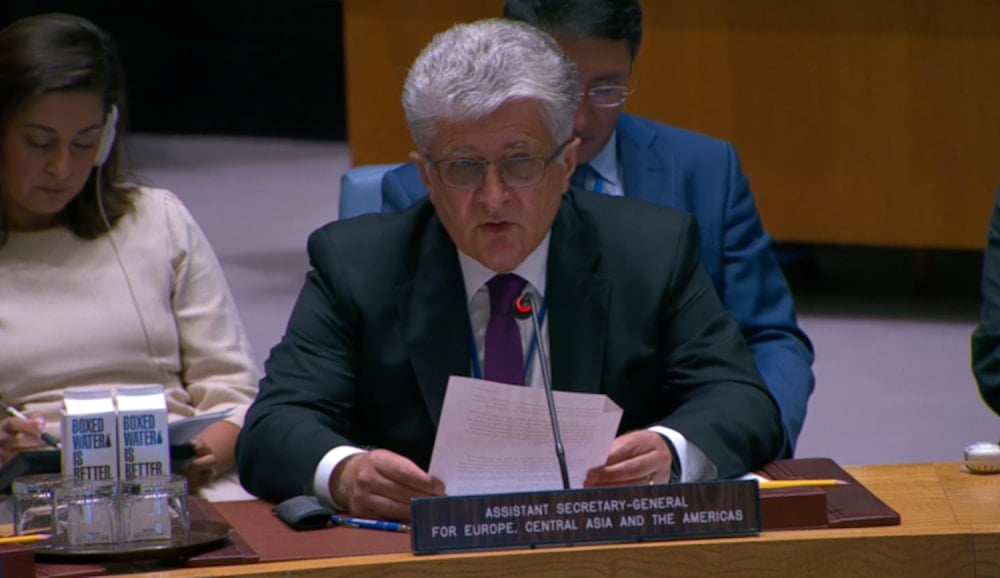UN warns Gaza city occupation plan could spark 'another calamity'
The UN has warned that "Israel's" newly approved plan to seize Gaza City, entailing mass displacement, siege, and permanent security control, could trigger "another calamity."
-

Assistant Secretary-General for Europe, Central Asia and the Americas Miroslav Jenča (Screenshot)
The United Nations has warned that "Israel's" newly approved plan to seize control of Gaza City represents a dangerous escalation that could unleash "another calamity" on the besieged territory, displacing hundreds of thousands and deepening its humanitarian catastrophe.
Briefing the Security Council, UN Assistant Secretary-General Miroslav Jenča said the Israeli security cabinet's decision, endorsed by Prime Minister Benjamin Netanyahu, could forcibly uproot up to 800,000 Palestinians from Gaza City by early October. Many are already displaced and would face months of siege before Israeli forces move to seize central Gaza's refugee camps. The plan's stated objectives include disarming Hamas, placing Gaza under permanent Israeli security control, and creating an "alternative civilian administration" excluding both Hamas and the Palestinian Authority.
"If these plans are implemented, they will likely trigger another calamity in Gaza, reverberating across the region and causing further forced displacement, killings, and destruction," Jenča told the Council. He stressed that the only path to ending Gaza's "unimaginable" suffering lies in a full, immediate, and permanent ceasefire, the unconditional release of all captives, unrestricted humanitarian access, and full adherence to international humanitarian law.
Gaza occupation plan
The Israeli cabinet's plan, approved after more than 10 hours of debate, marks the first stage of a broader aggression that could extend across the Gaza Strip. According to Israeli officials, around one million Palestinians in Gaza City and surrounding areas will be ordered to evacuate to central camps by October 7.
Netanyahu has pledged humanitarian aid outside combat zones, but critics note "Israel's" long history of indefinite military presence in occupied territories and its ongoing blockade of Gaza and their employment of man-made civilian starvation as a tool of war.
The cabinet also adopted five principles for "ending the war": disarming Hamas, securing the return of captives, fully demilitarizing Gaza, maintaining Israeli security control after the war, and installing a new administration without Hamas or the Palestinian Authority.
Ministers Itamar Ben-Gvir and Bezalel Smotrich opposed the plan, with Ben-Gvir rejecting any aid to Gaza while Smotrich insists operations continue unconditionally even during negotiations.
Global outrage
The plan has drawn sharp international criticism. UK Prime Minister Keir Starmer urged "Israel" to reverse the takeover, calling it "wrong" and counterproductive. UN High Commissioner for Human Rights Volker Türk demanded its suspension, warning it undermines the Palestinian right to self-determination. Turkey's senior presidential adviser Burhanettin Duran denounced the offensive as "outright genocide" and urged global action. The Iranian Foreign Ministry said it "is further proof of the entity’s intent to commit ethnic cleansing and genocide against the Palestinian people." Cuban Foreign Minister Bruno Rodríguez Parrilla said the plan would escalate violence against Palestinians and deepen an already dire humanitarian crisis.
Palestinian Ambassador to the United Nations Riyad Mansour called it a blatant violation of international law and a rejection of global consensus. Hamas has also rejected the move, calling it a sign that negotiations have been abandoned in favor of cementing permanent Israeli military control.
Read more: Israeli captives' families call to cripple economy over Gaza war plan
Occupation warning
Jenča reiterated that there is no military solution to the conflict and that Gaza must remain "an integral part of a Palestinian State," with the end of "Israel's" "unlawful occupation" and the creation of a two-State solution based on the pre-1967 borders, with Al-Quds as the shared capital. He urged the formation of a legitimate Palestinian government uniting Gaza and the West Bank and called on the Palestinian Authority to hold elections so Palestinians can "shape the future of the State of Palestine."
The UN official noted that the International Court of Justice has already ruled that "Israel" must not obstruct Palestinians' right to self-determination, warning that without urgent political, humanitarian, and security measures, the crisis will worsen with consequences far beyond Gaza.

 4 Min Read
4 Min Read








